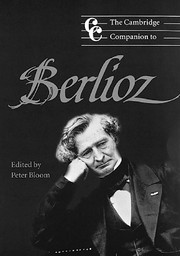Book contents
- Frontmatter
- Introduction: Berlioz on the eve of the bicentenary
- Part I Perspectives
- Part II Principal compositions
- 3 Genre in Berlioz
- 4 The symphonies
- 5 The concert overtures
- 6 The operas and the dramatic legend
- 7 The religious works
- 8 The songs
- Part III Major writings
- Part IV Execution
- Part V Critical encounters
- Part VI Renown
- Notes
- Bibliography
- Index
6 - The operas and the dramatic legend
from Part II - Principal compositions
Published online by Cambridge University Press: 28 September 2011
- Frontmatter
- Introduction: Berlioz on the eve of the bicentenary
- Part I Perspectives
- Part II Principal compositions
- 3 Genre in Berlioz
- 4 The symphonies
- 5 The concert overtures
- 6 The operas and the dramatic legend
- 7 The religious works
- 8 The songs
- Part III Major writings
- Part IV Execution
- Part V Critical encounters
- Part VI Renown
- Notes
- Bibliography
- Index
Summary
“Berlioz ne fut jamais, à proprement parler, un musicien de théâtre” – “Berlioz was never, properly speaking, a musician of the theatre.” This seems a strange judgment on a composer whose work is from beginning to end of intensely dramatic character, and who for most of his life was strongly interested in and closely connected with the musical stage. It is especially odd if one considers its source. Debussy when he made this remark (1893) was beginning work on his only complete opera, Pelléas et Mélisande. Like Berlioz he considered and even began composition on other operatic projects. And Debussy's operatic masterpiece, though it has had better luck staying in the repertory than Berlioz's Les Troyens, has always been more admired by devotees than loved by the general public, something true of Berlioz's great work as well. Debussy and Berlioz are surely greater composers than Massenet and Meyerbeer; but the latter were more successful stage composers in their own day.
Debussy is not alone in his opinion. Until quite recently critics tended toward the view, perhaps still current among music lovers in general, that Berlioz was more successful as dramatist in his symphonies than in his stage works. Why should this be so – the view, that is – when the reality, if the reader will accept my opinion as a definition of that undoubtedly slippery concept, is quite different? It began during the composer's lifetime.
- Type
- Chapter
- Information
- The Cambridge Companion to Berlioz , pp. 81 - 95Publisher: Cambridge University PressPrint publication year: 2000
- 1
- Cited by

